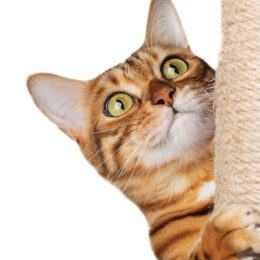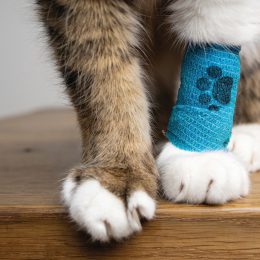The holidays are wonderful times for families and friends. But they aren’t without risks for our animal companions. “Whether you are leaving your pet at home or traveling with them during the holidays, planning is necessary to ensure they are safe,” said Dr. Steve Thompson, Purdue Veterinary Medicine clinical associate professor of small animal community practice. The following list can be helpful to pet owners as they consider safety for their animal companions during the holiday season:
 VISITORS. Pets can sometimes be overexcited, confused, or frightened by the onslaught of holiday guests. You can help by keeping your pet in a quiet part of the house, and making sure he/she has a safe retreat from children and well-intentioned visitors.
VISITORS. Pets can sometimes be overexcited, confused, or frightened by the onslaught of holiday guests. You can help by keeping your pet in a quiet part of the house, and making sure he/she has a safe retreat from children and well-intentioned visitors.
CHOCOLATE. Chocolate consumption is a serious pet poisoning risk, especially for dogs. Chocolate contains a chemical called theobromine, which can be fatally toxic to dogs if they eat enough of it. And as any dog owner knows, dogs aren’t famous for their ability to control their appetites! Furthermore, the types of chocolate found in our kitchens at holiday times, like bittersweet or baking chocolate, contain far more theobromine than the average Hershey bar. If your dog gets into some chocolate, be sure to call your veterinarian immediately to see if your pet needs medical attention.
TINSEL. Long, skinny pieces of plastic or string can be very dangerous to our furry friends. Cats and kittens seem to find shiny tinsel especially appealing. If eaten, thin pieces of string or tinsel can cause the intestines to bunch up, and can even cut through the intestinal wall. Either situation could be fatal, and would certainly necessitate a trip to the veterinarian.
ELECTRIC CORDS. Some animals, especially puppies, may chew cords and put themselves at risk of serious burns or electric shock. An animal that has been electrocuted may appear normal immediately after the injury. However, approximately 1-36 hours following the chewing incident, pulmonary edema starts to develop. This means that the lungs begin to fill with fluid and the animal displays very labored breathing, with an increased breathing rate and coughing. It looks like the animal can’t catch his or her breath. Another clue that a pet has been chewing on an electrical cord, is that the tongue or lips may have a white or seared area across it.
TRAVELING. Pet owners who travel and leave their pet at home have the option of boarding the animal or finding someone to watch it at home. Before boarding a pet, do your homework and get references to ensure you’re using a high-quality kennel. Animals should receive standard vaccinations about two weeks before boarding to ensure they have built up the proper antibodies against common diseases. Animals that travel with you might need a mild sedative to help prevent anxiety and carsickness. Have veterinary records handy in case of emergency.
ORNAMENTS. When using holiday decorations, remember that pets don’t understand the words “breakable,” “family heirloom,” or “sentimental value.” Rambunctious dogs, cats, and ferrets have been known to topple many an ornament and knick-knack, and sometimes even whole Christmas trees. Help prevent mishaps by keeping larger and weightier ornaments close to the floor, and valuable ornaments out of reach from curious mouths, noses, and wagging tails. Keep knick-knacks on shelves inaccessible to your animal companions. Also, make sure Christmas trees are tethered to a nearby wall or window frame if you have ferrets or cats fond of climbing.
CANDLES. Dancing flames and shadows thrown by candles are tantalizing to pets. But disaster can strike in an instant if a candle is toppled by a curious animal, or worse still, if a pet sets him/herself alight. In addition to making sure candles are never left burning unattended, make sure wagging tails and curious paws are kept a safe distance away from lit candles.
DECORATIVE PLANTS. Plants and greenery like holly, ivy, poinsettia, pine, cedar, balsam, amaryllis, and mistletoe can be very toxic if a pet ingests them. Visit the ASPCA for a full list of poisonous plants. If you have an emergency, you can call the animal poison control hotline at 1-888-426-4435.
OVEREATING. People aren’t the only ones who sometimes indulge in too much of a good thing. Table scraps, garbage raiding, and counter surfing can add up to lots of rich food in a pet’s stomach, which may lead to stomach upset. Even worse, too much rich food can lead to serious inflammation of the pancreas, which can be life-threatening. Keep pets on a normal diet even though they may try to persuade you not to!
NEW PETS. Many love the thought of surprising somebody with a new puppy or kitten on Christmas morning. However, because the holiday household is full of hustle and bustle, decorations, toys, treats, and stress, the excitement can cause a new pet to be confused or overstimulated. If you’ve decided it’s time for a new family member, consider waiting until the week after the holiday. Puppy- or kitten-proof the house, and introduce your new pet into a quiet, safe environment.
Be sure to contact your veterinarian in case of a holiday crisis. In cases of emergency, contact the Purdue Veterinary Medicine’s Emergency and Critical Care team at 765-494-1107.



